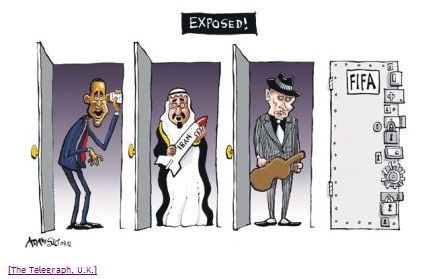
As I have pointed out over recent days, one of the most riveting aspects of the disclosure of classified U.S. diplomatic cables is that because they touch upon local issues and local leaders around the world, there are fascinating nuances of reaction from country to country.
Below are three articles we’ve translated from Spain’s El Pais, one of the five newspapers in the consortium selected by WikiLeaks to interpret the U.S. diplomatic cables for the world.
In the first article, headlined WikiLeaks: The Assault on ‘Big Brother’ Begins, columnist Liuis Bassets forecasts that America may be the first global power to feel the pain, but countries like China, ‘where audiovisual and cybernetic hyper-control of citizens is combined with military and police controls,’ are undoubtedly next.
What a blow little David WikiLeaks has issued to the forehead of Big Brother – who knows and controls everything! It’s understood that the U.S. government has tried to minimize the damage.
The international credibility and prestige that the U.S. had recovered thanks to Obama – and that was some of the most precious political capital of his presidency – is slipping away in full view of everyone, via the open channel of WikiLeaks.
But Big Brother, constantly on the advance in the U.S and Europe, has analogues elsewhere that are much worse and more faithful to the totalitarian Cold War model inspired by George Orwell, creator of the literary character. We refer to countries like China, where audiovisual and cybernetic hyper-control of citizens is combined with military and police controls that are the tradition for dictatorships. That such a leak hasn’t reached this even-more sinister and totalitarian version of Big Brother is not to discredit the revelations about the U.S. Nor does it mean that such disclosures won’t someday reach China. Technology and globalization will contribute to this, and hopefully soon. So will, no doubt, new powers – or emerging non-state counter-powers that arise out of global and technological civil society, of which WikiLeaks is only the first and most spectacular example.
The second article from Spain, by columnist Jan Martínez Ahrens, headlined U.S. Cables Expose Nuance of Displeasure with Spanish Government, discusses what the WikiLeaks disclosure and the American interpretations of Spain that they reveal can tell Spaniards about their political leaders and Spain’s standing in the eyes of America.
The primary object of the U.S. Embassy’s work is the socialist government. The picture painted by the three U.S. ambassadors over the past six years (billionaire George L. Argyros, Cuban-American Eduardo Aguirre and, for Obama Administration, philanthropist Alan D. Solomont) in their numerous secret missives to Washington – often with a copy to the CIA – outline the ups and downs of the relationship with Zapatero and his team. The picture exposes Spanish politics at the highest levels and presents an unprecedented inside look at American interests in Spain, which are often quite different from those of Spaniards.
In a report prepared by Ambassador Eduardo Aguirre and sent to Secretary of State Condoleezza Rice, it is stated that, “Zapatero is playing a game for the benefit of his leftist and pacifist electoral base, and uses foreign policy to score points in Spanish politics, rather than to address to key priorities of foreign policy or broader strategic objectives (…) This has led to a bilateral relationship that is zig-zagging erratically.”
This one-sided balance of power is reflected in the treatment dispensed to Spanish politicians. Not one of them is met with enthusiasm, except for the King (there is even advice on how to make oneself agreeable to him), and perhaps the military. Much more unfavorable is the description of the prime minister. From the beginning of his term, he is considered a problem for certain major aspects of U.S. foreign policy. He is defined as a short-term politician who puts electoral calculation ahead of the common interests of the nation.
Finally, in an article headlined Thanks to WikiLeaks’ Disclosure, Classical Diplomacy is Dead, columnist Jose Ignacio Torreblanca writes that the way diplomats work – and even their job descriptions, may never be the same:
Delving into the power struggles within a government, knowing who really commands or has influence, getting a sense of elite opinion, guessing what their real priorities are and their possibilities of success, all require talking to lots of people, here and there, to compose a picture that has some value. In this way, diplomats are like journalists and telegrams are like news items – only more sensitive. But with the difference that up to now, the rules of the game didn’t exist.
Now, with subjects knowing that their comments and opinions can be literally attributed to the source, and that embassies cannot preserve or protect their identities, diplomats will find a huge vacuum around them when they want to set aside their ceremonial and representational roles and get into matters of substance. After the disclosure by WikiLeaks, embassies will have to change the way they work if they want to survive. Most likely, WikiLeaks has hammered the final nail in the coffin of classical diplomacy.
READ ON AT WORLDMEETS.US, your most trusted translator and aggregator of foreign news and views about our nation. Log on for continuous global reaction to the leak of U.S. diplomatic cables. Coming up tomorrow, more Saudi Arabian and French reaction.
















